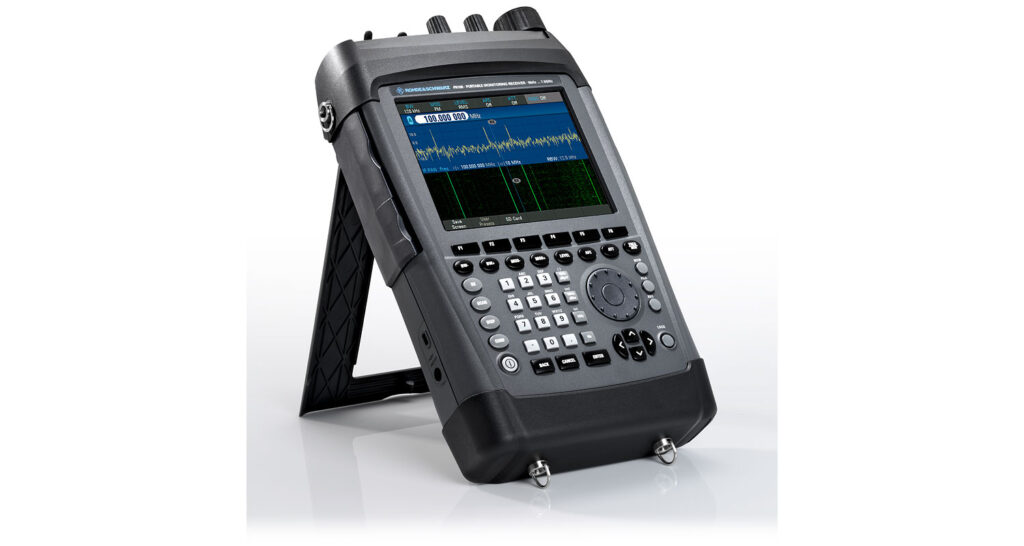On-site radiomonitoring from 9 kHz to 7.5 GHz.
Brief Description:
The R&S®PR100 portable receiver has been specifically designed for radiomonitoring applications in the field. The receiver’s functions and control concept have been optimized for monitoring tasks. In addition, it can be used for a variety of other applications.
The R&S®PR100 operates in a wide frequency range from 9 kHz to 7.5 GHz. Whether used for monitoring emissions, detecting interference or locating miniature transmitters, the receiver always combines high mobility with maximum operating ease. The receiver and the R&S®HE300 active directional antenna together form a compact receiving system. The receiver can also be used in conjunction with other antennas, e.g. broadband omnidirectional antennas.
Key Facts:
- Fast panorama scan across the entire frequency range from 9 kHz to 7.5 GHz
- 10 MHz IF spectrum and demodulation with bandwidths from 150 Hz to 500 kHz
- Spectrum and spectrogram (waterfall) display on 6.5″ color screen
- Storage of measurement data to receiver’s built-in SD card
- LAN interface for remote control and data output
- Ergonomic and rugged design for portable use
- Low weight: 3.5 kg including battery
- Manual location of emissions with the R&S®HE300 active directional antenna (9 kHz to 7.5 GHz)
- Automatic location of emissions with direction finding algorithms (20 MHz to 6 GHz)
- Display of digital maps on the R&S®PR100; triangulation based on multiple, manually or automatically determined DF results
Features & Benefits:
- Future-ready investment
- Wide frequency range and outstanding performance
- Capable of receiving and processing signals of current and future radio services
- High receiver sensitivity, high signal resolution
- State-of-the-art digital signal processing for high receiver sensitivity and detection of extremely weak signals, without any loss in processing speed
- Significantly superior receiver sensitivity and signal resolution (compared with conventional analog receivers)
- Retrieval of information through demodulation
- Analog-modulated signals demodulated directly in the receiver; contents audible using headphones or built-in loudspeaker
- Digitally modulated signals converted to the baseband using I/Q demodulation and stored in the receiver or exported via LAN
- Online and offline analysis of digitally modulated signals, e.g. with the R&S®GX430 software
- Detection of pulsed signals and radar emissions
- Capture of short-duration pulses, such as radar emissions
- Wide IF bandwidth for analysis of short-duration pulses and pulse packets
- Monitoring receiver and mobile data memory in a single unit
- Collected information written directly to the receiver’s built-in SD card
- Offline analysis of data recording during monitoring
- Efficient operation via remote control
- Full remote control via LAN interface (SCPI commands to IEEE 488.2)
- Efficient, remote receiver operation, e.g. in unattended monitoring stations
- R&S®PR100-Control remote control software from the R&S®RAMON software family included
- Battery operation for mobile use
- Low weight: 3.5 kg including battery
- Long battery-powered operation: approx. 4 hours
- Intuitive and simple operation
- Short learning curve due to straightforward menu structure and simple operation
- Large 6.5″ color display for signal analysis
Specifications:
Price: TBDLink
Frequency range 9 kHz to 7.5 GHz RF input Impedance 50 Ω Preselection 9 kHz to 30 MHz 30 MHz lowpass filter 20 MHz to 1.5 GHz tuned bandpass filters 1.5 GHz to 7.5 GHz highpass/lowpass filter combination IF data IF spectrum display range 1 kHz to 10 MHz,
1/2/5/10/20/50/100/200/500 kHz,
1/2/5/10 MHzDisplay modes normal (clear/write), average, max. hold, min. hold IF demodulation bandwidths 15 filters (specified values indicate 3 dB bandwidth) 150/300/600 Hz,
1.5/2.4/6/9/15/30/50/120/150/
250/300/500 kHzDemodulation modes all demodulation bandwidths AM, FM, PULSE, I/Q demodulation bandwidth ≤ 9 kHz LSB demodulation bandwidth ≤ 15 kHz ISB demodulation bandwidth ≤ 9 kHz CW Scan modes Frequency scan (FScan) start and stop frequency, step width user-selectable scan speed up to 200 channels/s Memory scan (MScan) memory locations 1024, user-programmable scan speed up to 150 channels/s Panorama scan (PScan) start and stop frequency user-selectable resolution bandwidths (bin widths) 125/250/500/625 Hz,
1.25/2.5/3.125/6.25/12.5/25/50/100 kHzscan speed (RBW = 100 kHz, measurement time = 500 μs, IF spectrum = normal, clear/write, display mode = IF spectrum) up to 2 GHz/s DF mode Frequency range 20 MHz to 6 GHz DF method 20 MHz to 173 MHz Watson-Watt 173 MHz to 6 GHz correlative interferometer Display resolution selectable 0.1° or 1°
Price: TBD

